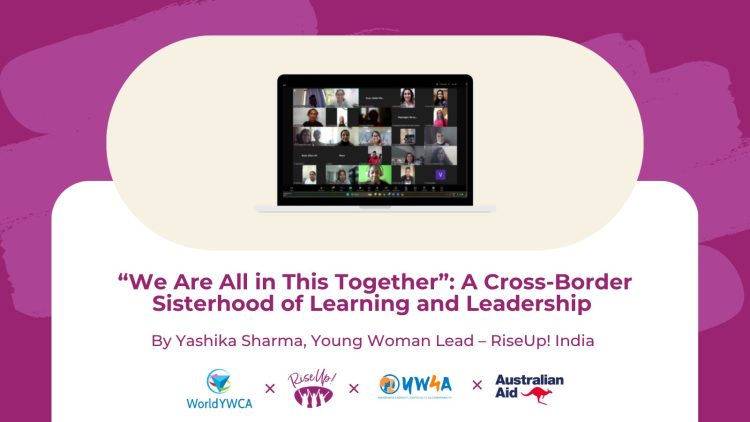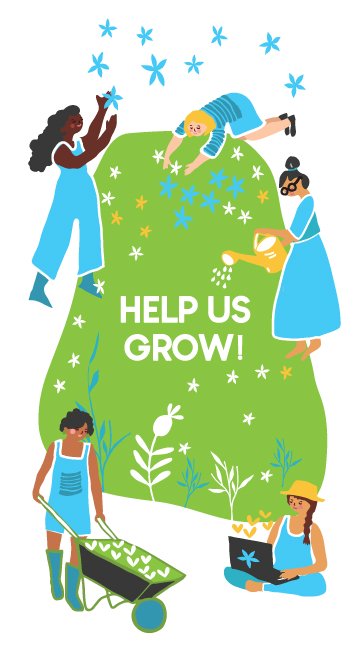On 30th May, I had the privilege of co-moderating a unique and inspiring virtual gathering, one that spanned across continents, time zones, and realities. As part of a cross-program learning and Exchange Session, I joined hands with Vonclaire from Kenya to facilitate a powerful dialogue between young women in World YWCA’s RiseUp! Asia-Pacific and Young Women for Awareness, Agency, Advocacy & Accountability (YW4A)* initiatives. Both programs use World YWCA signature tools, including the RiseUp! Transformative Leadership Guide, Safe Spaces, Brave Spaces, and the Feminist Consultation Methodology.
Though we were separated by borders, time zones, and languages, we were united by a shared purpose: building a more just, equitable, and inclusive world for girls and young women. We were joined by #YoungWomanLeaders from Egypt, South Sudan, Kenya, Palestine, India, Bangladesh, Nepal, Thailand, Myanmar, Sri Lanka, Papua New Guinea, and the Solomon Islands. These were not just names on a Zoom screen — they were women holding lived experiences, stories of resilience and intergenerational wisdom.
We started with a simple and reflective question: “What’s your favourite song?” As each young woman unmuted to share, the screen lit up with a diverse range of musical inspirations. Someone from Bangladesh mentioned “Ekla Chalo Re,” by Rabindranath Tagore, a call to continue walking even if you are alone. Another young woman from Egypt shared “Insaan” by Hamza, reminding us of the power of being human in unjust systems. It was a soft, almost poetic reminder that resistance can sound like music, and that solidarity speaks many languages.
Then came the heart of the session, a rotating panel, where each young woman spoke, not from theory, but from lived experience. A young woman leader from South Sudan spoke about the training-of-trainer model, where they hosted a training for a group of young women in her community, who then train the other local young women. “They were shy at first,” she said, “but once they saw each other take part, something clicked. They began training others. It became theirs.”
Her words reminded me of the first training we hosted in a low-income community in Trilokpuri, Delhi. A young girl, barely 19, had told us she’d never spoken in front of others before. By the end of the workshop, she was excited to lead a role-play session on gender-based violence. That moment lives with me.
Another young woman leader from Bangladesh shared how talking about mental health and gender-based violence was nearly impossible at first. “Girls wouldn’t even make eye contact,” she said. “But when we used the local language, when we just listened, they started to speak.” Another voice added a quiet truth: “Local trainers carry the trust of the community. They know when to speak, and when to just sit with someone.” That line: “when to sit with someone”, felt deeply true.
From Palestine to PNG, every young woman echoed this: when young women feel seen, heard, and understood, they #RiseUp!. Not perfectly. Not without fear. But they rise.
We weren’t afraid to talk about hard things either. Young women leaders from different lived experiences shared the harsh realities faced by young women in their countries. A young woman leader from Bangladesh shared how political instability and growing conservatism leads to abuse of women’s rights and forced the team to tweak language. “It felt like we were silencing ourselves,” she said, “but we had to survive, adapt, and find other ways to hold space.” Another young woman leader from Palestine spoke about the double marginalisation of women living under occupation. “Even stepping outside can be dangerous,” she said. “We are told to stay silent. But liberation without young women is incomplete.” In Egypt, feminism is misunderstood and used against women activists. “People say feminists hate men. But all we’re asking is to be treated as equals. We use simple language, relatable examples. It’s not about being loud, it’s about being clear.”
These were not just stories. They were roadmaps. And as I listened, I realised each one of us was not just learning from each other’s victories, but also from our coping, our creativity, and our quiet defiance.
With growing global uncertainties on gender programming and budget cuts, we also discussed how to sustain the spark of our programmes. One of the final questions asked:
“If the program ended today, how would you keep going?”
Young women leaders said:
“Zoom. WhatsApp. Whatever we have – we will use. We’ll still gather, still build safe spaces.”
RiseUp! and YW4A shaped the leadership journey of not just trainees but also the trainers. It becomes a dream to create more spaces for others.
“If we don’t have enough tools, we become the tools.” The power of feminist micro-funding, small but mighty support systems that allow young women to continue their advocacy, even when the big programmes stop.
From storytelling cycles in South Sudan, to theatre in Egypt, puppet plays in Erode, street plays in Delhi, and intergenerational mentoring in Thailand, we shared best practices in our countries
like gifts with each other. Cultural practices became bridges. What worked in one corner of the world could be reimagined in another.
Spaces like these aren’t just about dialogue. They are about recognition. They remind us that:
- Empathy is built through stories.
- Courage is contagious.
- Solutions aren’t imported, they are inspired.
When young women gather across faiths, flags, and languages, something powerful happens. We begin to see that our struggles are interconnected. That the systems we fight are different versions of the same story. And that none of us is truly alone.
As we closed, I asked: “What is one thing you are taking with you today?” Answers flowed in:
- “New ideas I hadn’t imagined before.”
- “Feeling seen, even from far away.”
- “Confidence that our work matters.”
- “We are not so different.”
And then someone wrote in the chat what we had all been feeling: “We are all in this together.”
That, perhaps, is the most powerful learning of all. Our stories deserve to be told, and our leaders deserve to be heard.
*The YW4A partnership is a unique collaboration of the Netherlands Government’s Ministry of Foreign Affairs, young women, feminists and gender equality champions, faith-based advocates, gender researchers and legal and policy experts, all coming together to influence political decision-making at all levels. World YWCA is the Consortium lead.






